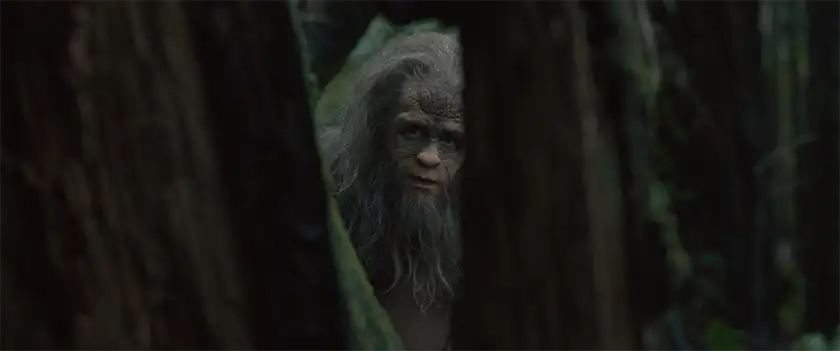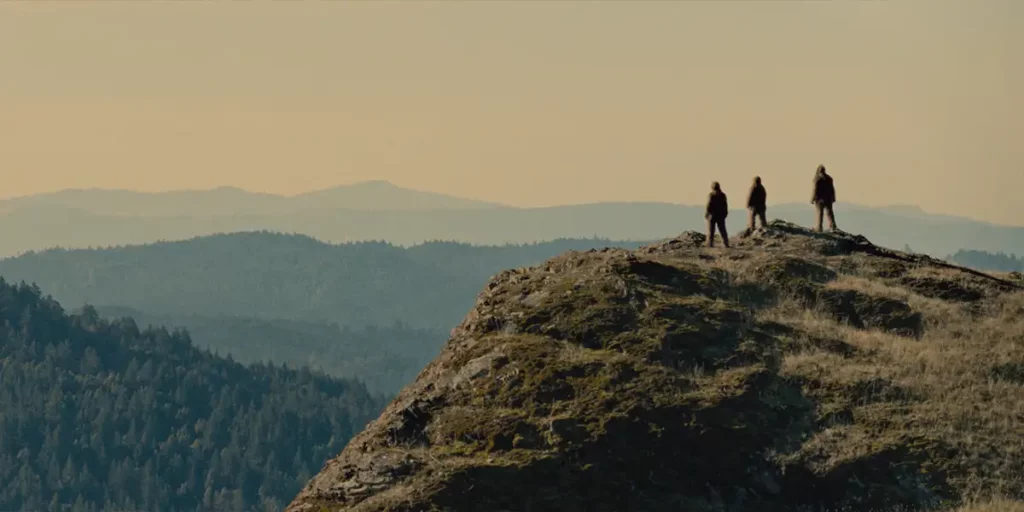David and Nathan Zellner’s Sasquatch Sunset examines the cross sections between humanity and nature with an unforgettable performance from Riley Keough.
Sasquatch Sunset is by no means an easily digestible film. The story tracks a family of Sasquatches (played by Riley Keough, Jesse Eisenberg, Christophe Zajac-Denek and Nathan Zellner) throughout a calendar year and grapples with the changing forest they call home. David Zellner’s script is void of words but rather employs grunts and intense physicality to portray the inner world of the creatures the movie centers on. There is also an unrelenting vulgarity to the film due to the nature of these animals, which adds to the intensity of the viewing experience. To put it plainly, it’s a hard sell. However, if you’re able to commit, you will be able to witness the star power of Riley Keough in full force as she single-handedly brings this story to life.
The film, broken down into seasons, starts off in spring, centering on the daily lives of this family of four Sasquatches. None of the Sasquatches are given names nor are their relationships overtly explained. Keough’s (Daisy Jones & the Six) character is the only female Sasquatch and is mates with Eisenberg’s (A Real Pain) Sasquatch, much to Zellner’s Sasquatch chagrin. Zajac-Denek’s (Twin Peaks: The Return) Sasquatch is the innocent, child-like member of the pack who exhibits a curiosity about the world they live in.
At first, Sasquatch Sunset seems like a gimmicky film, far too reliant on slapstick humor and its own absurdity to stand as any type of impactful story. The pacing mirrors the daily lives of these creatures: slow and uneventful with the occasional flash of crude animalistic acts. The humor is not unfunny, but extremely graphic and vulgar. As the story progresses, however, the audience begins to see flashes of humanity in these creatures and a real kinship between the Sasquatches and audience members begins to develop.
These Sasquatches are curious about the world around them. They acknowledge the stars above them at night, they are inquisitive about the animals they come across and they even make attempts at actions like counting to try and make sense of their surroundings. It is Keough’s character and performance, however, that really make an impact on the audience as she begins to discover herself.
Without a shadow of a doubt, the reason this film works is Keough’s performance. As the movie begins to center around her more, the audience is able to actually latch onto a character and understand while she may be playing an animal, she experiences life and loss and love the same way we humans do.

FIX: She carries her character with a sense of grace that doesn’t make her portrayal of a Sasquatch seem any less authentic, but more palpable as a character that is trying to make sense of the world that is changing around her. There’s a maternal nature to her that the male Sasquatches played by Eisenberg and Zellner lack. Their Sasquatches are brute and tackle the things in nature they are curious about with violence and harshness that ultimately put them in situations they cannot endure. Keough’s Sasquatch, on the other hand, approaches the things that scare or entice her with her wits and patience.
Keough’s character is so intriguing in this study of primal nature. Where the older male Sasquatches embody the inherent brutality that animals have, Keough’s Sasquatch shows the primal sympathy and compassion animals also carry. Her character goes through the biggest transformation throughout the film, as the audience sees her coming to terms with her place in nature, and while she remains animalistic, she evolves into a heavily nuanced character.
There is a degree of juxtaposition within Sasquatch Sunset that allows it to work. On the one hand, you get the vulgar slapstick comedy you believe you are signing up for when you sit down to watch the film. However, as you spend more time with this misfit band of Sasquatches, you begin to understand both the deep emotional lives that all animals experience and the ways in which we, as humans, are animals at our core, equally a part of nature as the next mammal.
It’s a challenging movie to buy into. As a member of the audience, you need to develop an understanding of the Sasquatch-ian language in order to understand it – the score does step in to help give the audience emotional cues throughout its runtime. The first season drags on as it focuses on the day-to-day world of the Sasquatch family, which mainly consists of eating grass, hiking the forest, and usually relieving themselves of some bodily fluid in one form or another. The humor is animalistic, which translates to crude jokes reliant on the shock factor to gain laughs from the audience. This isn’t to say the film is unfunny; it’s rather more one-note.
There’s a certain respect I have for films like Sasquatch Sunset. It’s the type of movie that is utterly committed to its objectives and desires to tell a story without compromising its vision for massive commercial appeal. It most certainly is not a film for everyone, but it is a film that will impact you if you bear with it, even through its most vulgar and unappealing moments.
Sasquatch Sunset will be released in US theaters on April 12, 2024.

